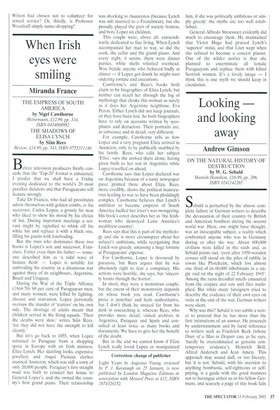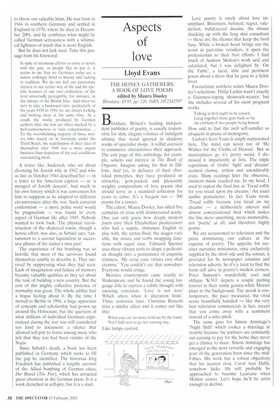Looking and looking away
Andrew Gimson
ON THE NATURAL HISTORY OF DESTRUCTION by W. G. Sebald
Hamish Hamilton, £16.99, pp. 206, ISBN 0241141265
Sebald is perturbed by the almost complete failure of German writers to describe the devastation of their country by British and American bombers during the second world war. Here, one might have thought, was an inescapable subject, a reality which confronted anyone who was in Germany during or after the war. About 600,000 civilians were killed in the raids and, as Sebald points out, 'even after 1950 wooden crosses still stood on the piles of rubble in towns like Pforzheim, which lost almost one third of its 60,000 inhabitants in a single raid on the night of 22 February 1945'. Among the ruins dreadful smells emanated from the corpses and rats and flies multiplied. But while many foreigners tried to describe the evidence of their own eyes on visits at the end of the war, German writers were silent.
Why was this? Sebald is too subtle a writer to pretend that he has more than the first intimations of an answer. He proceeds by understatement and by lucid reference to writers such as Friedrich Reck (whose Diary of a Man in Despair can, as he says, 'hardly be overestimated as genuine contemporary evidence'). Heinrich Boll, Alfred Andersch and Jean Amery. This approach may sound dull, or too literary, but it is not. Sebald, with his aversion to anything bombastic, self-righteous or selfpitying, is a guide with the good manners not to harangue either us or his fellow Germans, and scarcely a page of this book fails to throw out valuable hints. He was born in 1944 in southern Germany and settled in England in 1970, where he died in December 2001, and he combines what might be called German seriousness with a whimsical lightness of touch that is more English.
But he does not lack steel. Take this passage from his foreword:
In spite of strenuous efforts to come to terms with the past, as people like to put it, it seems to me that we Germans today are a nation strikingly blind to history and lacking in tradition. We do not feel any passionate interest in our earlier way of life and the specific features of our own civilisation, of the kind universally perceptible, for instance, in the culture of the British Isles. And when we turn to take a backward view, particularly of the years 1930 to 1950, we are always looking and looking away at the same time. As a result, the works produced by German authors after the war are often marked by a half-consciousness or false consciousness ... To the overwhelming majority of those writers who stayed on in Germany under the Third Reich, the redefinition of their idea of themselves after 1945 was a more urgent business than depiction of the real conditions surrounding them.
A writer like Andersch, who set about divorcing his Jewish wife in 1942 and who as late as October 1944 described her in a letter to his American captors — as 'a mongrel of Jewish descent', had much in his own history which it was convenient for him to suppress as he adapted to different circumstances after the war. Such careerist conformism — a more polite word would be pragmatism — was found in every aspect of German life after 1945. Nobody wanted to look back. The physical reconstruction of the shattered towns, though a heroic effort, was also, as Sebald says, 'tantamount to a second liquidation in successive phases of the nation's own past'.
The experience of the bombing was so horrific that most of the survivors found themselves unable to describe it. They survived by suppressing what they had seen. Lack of imagination and failure of memory became valuable qualities as they set about the task of building a new country. But the cost of this mighty collective pretence of normality was great. The whole edifice had a bogus feeling about it. By the time I moved to Berlin in 1994, a huge apparatus of concepts and scholarship had grown up around the Holocaust, but the question of what millions of individual Germans experienced during the war was still considered too hard to document: a silence that allowed self-pity to fester among many who felt that they too had been victims of the Nazis.
Since •Sebald's death, a book has been published in Germany which seeks to fill the gap he identified. The historian Jorg Friedrich has published a lengthy account of the Allied bombing of German cities, Der Brand (The Fire), which has attracted great attention in the German press. It is a work drenched in self-pity, but it is a start.



































































 Previous page
Previous page